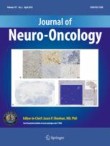
Medicine by Alexandros G. Sfakianakis,Anapafseos 5 Agios Nikolaos 72100 Crete Greece,00302841026182,00306932607174,alsfakia@gmail.com,
Πληροφορίες
Ετικέτες
Τρίτη 5 Μαΐου 2020
Genetic analysis in patients with newly diagnosed glioblastomas treated with interferon-beta plus temozolomide in comparison with temozolomide alone
Genetic analysis in patients with newly diagnosed glioblastomas treated with interferon-beta plus temozolomide in comparison with temozolomide alone:


Αναρτήθηκε από
Medicine by Alexandros G. Sfakianakis,Anapafseos 5 Agios Nikolaos 72100 Crete Greece,00302841026182,00306932607174,alsfakia@gmail.com,
στις
1:00 π.μ.

Ετικέτες
00302841026182,
00306932607174,
alsfakia@gmail.com,
Anapafseos 5 Agios Nikolaos 72100 Crete Greece,
Medicine by Alexandros G. Sfakianakis,
Telephone consultation 11855 int 1193
Εγγραφή σε:
Σχόλια ανάρτησης (Atom)
Αρχειοθήκη ιστολογίου
-
►
2023
(276)
- ► Φεβρουαρίου (133)
- ► Ιανουαρίου (143)
-
►
2022
(1976)
- ► Δεκεμβρίου (116)
- ► Σεπτεμβρίου (158)
- ► Φεβρουαρίου (165)
- ► Ιανουαρίου (161)
-
►
2021
(3661)
- ► Δεκεμβρίου (161)
- ► Σεπτεμβρίου (274)
- ► Φεβρουαρίου (64)
- ► Ιανουαρίου (368)
-
▼
2020
(4554)
- ► Δεκεμβρίου (400)
- ► Σεπτεμβρίου (381)
-
▼
Μαΐου
(271)
- Medicine by Alexandros G. Sfakianakis,
- Medicine by Alexandros G. Sfakianakis,Anapafseos 5...
- Ephemeris Medicine by Alexandros G. Sfakianakis,An...
- Ephemeris Medicine by Alexandros G. Sfakianakis,An...
- Ephemeris Medicine by Alexandros G. Sfakianakis
- Medicine by Alexandros G. Sfakianakis,
- Medicine by Alexandros G. Sfakianakis,
- An apparent new syndrome of extreme short stature,...
- Exome sequencing identifies new somatic alteration...
- Nitric oxide inhalation as an interventional rescu...
- In healthy subjects, green kiwifruit increases sto...
- SAGE Publications Ltd: Antiviral Chemistry an...
- Staphylococcus aureus Prostatic Abscess in the Set...
- Late-onset postsurgical hypoparathyroidism followi...
- Malignant transformation of oral leukoplakia: a fo...
- Effect of orally administered magnesium on postope...
- Dietary fatty acids and the time elapsed from thei...
- tooth loss is independently associated with caroti...
- Inhibition of neutrophil inflammatory mediator exp...
- SAGE Publications Ltd: Journal of Internation...
- Pursuing symmetry in reconstruction of the upper l...
- Histopathology of fluoroscopy‐induced radiation ul...
- Re‐Induktion einer Checkpoint‐Inhibitor‐Therapie b...
- Ligamentum arteriosum calcification that presented...
- Management of a metal foreign body entering the th...
- A comparative study of low-level laser effica...
- Can we safely reduce the radiation dose to the hea...
- Diagnostic Performance of Four Ultrasound Risk Str...
- Risk Stratification Using a Novel Genetic Classifi...
- Autoimmune Thyroiditis Induced by Immunization wit...
- In medicine, Valentino's syndrome is pain presenti...
- Evaluation of the effects of photobiomodulation th...
- Mechanical transnasal endoscopic dacryocystorhinos...
- Sialodochitis fibrinosa: salivary duct obstruction...
- Journal of Craniofacial Surgery - Published A...
- Survival outcomes after surgical treatment of oral...
- Comparison of the Efficiacy of Intra-Articular Inj...
- SECg Staging System: A New Approach to the Managem...
- Foods, V
- Hesperidin on Cardiovascular Disease Risk Factors:...
- Nutrients, Vol. 12, Pages 1482: Tart Cherry Increa...
- Social Sciences, Vol. 9, Pages 86: Elsa as Horse W...
- Nutr
- Medici
- Porphyromonas gingivalis, Tannerella forsythia, Tr...
- Medicina, Vol. 56, Pages 248: Pleomorphic Adenoma ...
- International Journal of Molecular Sciences,
- International Journal of Environmental Resear...
- IJMS, Vol. 21, Pages 3613: Role and Mechanisms of ...
- Cel
- Healthcare, Vol. 8, Pages 139: Automatic Detection...
- Diseases, Vol. 8, Pages 15: Plasmodium falciparum ...
- Cancers, Vol. 12, Pages 1289: Germline Mutation in...
- Cancers, Vol. 12, Pages 1291: Venous Thromboemboli...
- Biomolecules, Vol. 10, Pages 789: MARK4 Inhibited ...
- ICI, CTLA-4, PD-1 and PD-L1, have shown significan...
- Antibiot
- Medicine by Alexandros G. Sfakianakis,
- Medicine by Alexandros G. Sfakianakis,
- Medicine by Alexandros G. Sfakianakis
- Medicine by Alexandros G. Sfakianakis,
- Medicine by Alexandros G. Sfakianakis,
- Medicine by Alexandros G. Sfakianakis
- Smart Cities, Vol. 3, Pages 362-384: An Inves...
- Scientia Pharmaceutica,
- Religions, Vol. 11, Pages 235: When Piety Is ...
- Sci, Vol. 2, Pages 31: Antioxidant Properties of W...
- Robotics, Vol. 9, Pages 32: A Survey on Mechanical...
- Risks, Vol. 8, Pages 45: Towards an Economic Cyber...
- Recycling, Vol. 5, Pages 10: Facility Location Pro...
- Plants,
- Proteomes, Vol. 8, Pages 9: Urinary Extracellular ...
- Pharmacy, Vol. 8, Pages 82: Pharmacists and C...
- Pharm
- Pharmac
- Pathogen
- Nutr
- Nanoma
- Mo
- Molb
- Microorganisms, Vol. 8, Pages 702: Bacillus t...
- Methods and Protocols,
- Membrane
- Metabolites, Vol. 10, Pages 187: Metabolite Change...
- Medicina, Vol. 56, Pages 228: Acute Effects o...
- Journal of Clinical Medicine,
- Medicines, Vol. 7, Pages 26: Plant Polyphenols, Mo...
- Life, Vol. 10, Pages 57: Targeting the C-Terminal ...
- JPM, Vol. 10, Pages 37: Future Trends in Nebulized...
- JFMK, Vol. 5, Pages 32: 25-Hydroxyvitamin D, Vitam...
- International Journal of Neonatal Screening,
- International Journal of Molecular Sciences,
- International Journal of Environmental Researc...
- Healthcare, Vol. 8, Pages 131: Nurses’ Experi...
- Foods, Vol. 9, Pages 611: Effects of Shiitake...
- Diversity, Vol. 12, Pages 185: Drivers of Fol...
- Diseases, Vol. 8, Pages 13: Inflammatory Bowe...
- Diagno
- Dentistry Journal, Vol. 8, Pages 48: A New Te...
- ► Φεβρουαρίου (638)
- ► Ιανουαρίου (691)

Δεν υπάρχουν σχόλια:
Δημοσίευση σχολίου